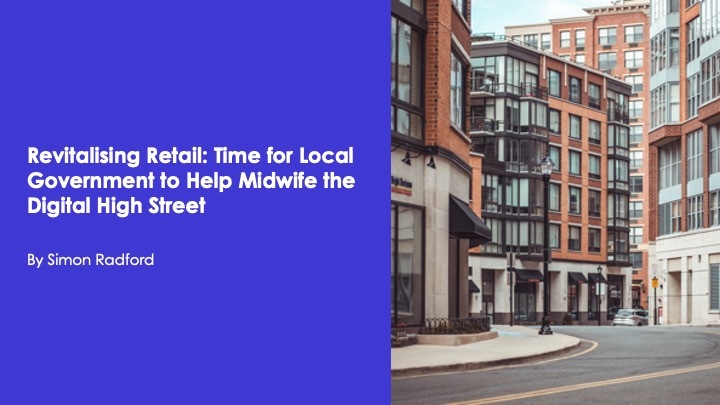Revitalising Retail: Time for Local Government to Help Midwife the Digital High Street

By Simon Radford
During the first year of the pandemic “an average of 48 shops, restaurants and other leisure and hospitality venues
closed permanently every day across England, Wales and Scotland”. This would be a chilling enough statistic without considering the fact that the campaign group “Save the High Street” has been running since 2016, moved by the decline of High Streets across the UK long before reports from China of a strange new bat-related virus.
We believe there’s an exciting opportunity to turn this around as we turn the page on Covid-19, and pent-up demand from savers starts to find its way to the nation’s shops and retailers once more, but it’s only going to work if we systematically adopt the new technologies and strategies that retool the High Street to compete more effectively with the ecommerce convenience that so characterised lockdown life. A coalition of councils, shop owners, and Britain’s burgeoning retail startup scene can create a rare win-win-win arrangement to drive this agenda, if only councils show the willing to put together innovation teams to undertake this effort.
Why is this necessary? Is there not talk of a post-Covid shopping boom? A post-pandemic sugar high is not an adequate prescription for permanent renewal. While some local politicians might be happy “leaving it to the market” and letting local shops fail where they prove less popular than online alternatives, it is clear that voters feel that it is very much within the political remit to actively shape local community spaces, including High Streets, and these places matter to them: it’s particularly interesting to note Survation’s polling showing that local people need to drive change to prioritise community assets as part of any Levelling Up agenda, while Deborah Mattinson’s impactful study on the changes besetting the battleground “Red Wall” seats made much of the loss of shops on local High Streets, and the loss of prestige brands like Marks and Spencer in particular.
To date, political responses have proved willing but basic, and tepidly effective. In Barnet, local residents associations have started their own “Digital High Street” initiative, which arranges for a local directory of shops and their websites, while Lichfield in the West Midlands has spurred local shoppers to post about their local shops on social media. For local councils to truly change habits and improve the lot of their thousands of shops, sustained, ongoing, institutional support is needed for retailers as innovations come to market and new pain points and opportunities emerge to truly change the fortunes of a local economy.
The good news is that local governments already have a valuable asset which they currently do too little with: they’re trusted by thousands of local businesses, with whom they regularly communicate every year – and for RetailTech startups, this can be a game-changer. Imagine how many local shops would benefit from NearSt, a startup which allows local shops to market inventory to those searching online for that product. Or how local restaurants might benefit from Vita Mojo, a startup that enables eateries to establish their digital brand by optimising their mobile ordering, facilitate click and collect and delivery, and integrates with both their Point of Sale and back of house operations. And while many restaurants bemoan the cut taken from platforms like Deliveroo and JustEat, why couldn’t local directories of businesses have last-mile support from a startup like Stuart.com to get a greater share of the business they serve? From magic mirrors in clothes shops, new brands marketing themselves to newly health-conscious consumers, or startups like Cutbox facilitating much-needed post-lockdown grooming services, there are startups that could partner to help any type of local business across its operations, from marketing and payments to reviews and accounting, and help level the playing field for smaller, independent businesses to compete.
In exchange for matchmaking startups that crave local customers and retailers who could use an injection of digital innovation, local councils could negotiate both discounts for being preferred local framework partners and potentially revenue shares which could raise much-needed local revenue. Even where there might be little incentive for digital players to pay councils for access to local businesses, promoting ecommerce enablers like Shopify could help diversify revenues away from just local patrons and increase the chances of survival and a more reliable stream of business rates and fewer boarded-up shops into the future, more than paying for itself indirectly.
So, as we emerge from the pandemic and politicians look for those elusive ideas that can both improve life for citizens, prove popular, and
make money rather than costing it, let them invest in partnering with those of us experienced in creating innovation teams to craft their digital startup package for independent shops choosing to open locally. It might make the difference between thriving independent stores creating local High Streets which reflect the character of those who live there, and the continuing decline of once-bustling local meeting places. Why should we resign ourselves to going from Napoleon’s “nation of shopkeepers” to a nation of pound shops and former glories?


